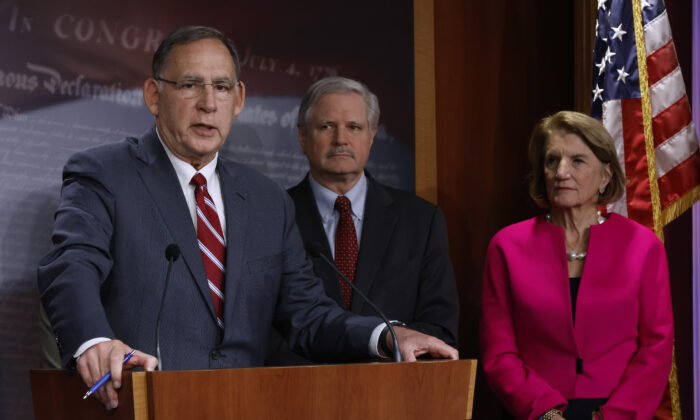By Mark Tapscott
Thirty-one of the Senate’s 49 Republicans are co-sponsoring a bill to nullify a Biden administration proposal by banning the IRS from conducting surveillance on the financial affairs of virtually all individual Americans.
The lead co-sponsors of the “Prohibiting IRS Financial Surveillance Act” include Sens. John Boozman and Tom Cotton, both from Arkansas, as well as Senate Finance Committee Ranking Member Mike Crapo (R-Idaho) and Senate Banking, Housing and Urban Affairs Committee Ranking Member Tim Scott (R-S.C.).
The proposal prohibits the secretary of the Department of the Treasury from tracking “the inflows or outflows of any account maintained by such institution, or (2) any balances, transactions, transfers, or similar information with respect to any such account.”
The proposal qualifies the prohibition “except to the extent that such reporting is required under any program, or other provision of law, as in effect on the date of the enactment of this Act.” Since the IRS already can summon financial transaction records for purposes of a tax audit, the Senate Republicans’ proposal wouldn’t limit the tax agency’s power in such instances, but it would prohibit future expansions beyond auditing.
“The IRS has failed to secure private information and often struggles to provide basic customer service to the millions of American taxpayers it’s accountable to and was designed to serve. It has no business attempting to monitor their every bank transaction and requiring financial institutions to turn over this data. Our bill would ensure the agency stays out of innocent Americans’ personal finances,” Boozman said in a Feb. 22 joint statement.
Cotton said in the statement: “The IRS has no business collecting the financial data of millions of Americans. This legislation is necessary to protect against the Biden administration’s proposals that would give the IRS access to personal banking information and threaten the privacy of every American,”
Scott stated: “Under the Biden administration and progressive leadership, the IRS has proposed outrageous actions that threaten the privacy of American taxpayers. In light of this pattern, this legislation will prevent the IRS from taking future steps to encroach on the lives and finances of everyday Americans.”
Crapo added that “Americans are justifiably concerned about providing sensitive customer data to the IRS, an agency with an extensive history of leaks, hacks and other violations of taxpayer confidentiality. They loudly rejected the IRS bank reporting dragnet when it was originally proposed, and this legislation will prevent the IRS from turning banks and credit unions into private investigators for law-abiding Americans.”
The Senate Republicans’ proposal is a response to an initiative introduced by the Biden administration in 2021 to require banks to report to the IRS all financial transactions of $600 or more in individual bank accounts. That approach was modified in October 2021 in response to strong public and political opposition to the invasive nature of the proposal.
“In response to considerations about scope, it has crafted a new approach to include an exemption for wage and salary earners and federal program beneficiaries. Under this revised approach, such earners can be completely carved out of the reporting structure,” according to a fact sheet from the Treasury Department.
“This is a well-reasoned modification: For American workers and retirees, the IRS already has information on wage and salary income and the federal benefits they receive. The Treasury Department is supportive of Congress’s tailoring of the compliance regime to shed light on income that is unreported to the IRS presently.”
Under the revised proposal, the Treasury Department stated that “financial institutions and banks will add just two additional numbers to the information that they already supply to taxpayers and the IRS: The total amount of funds deposited into the account and the total amount withdrawn over the course of a year. The scope of this information sharing is extremely limited. Banks will not share with the IRS any information to track individual transactions under this proposal, and the IRS will have no ability to track individual transactions.”
Biden administration officials defend the proposal as needed to enable the IRS to more effectively account for and collect levies on income received by wealthy individuals from sources other than those covered by Forms W-2 and 1099.
Federal tax officials estimate the cost of tax evasion among the top 1 percent of filers to be as much as $160 billion annually. Overall, administration officials contend the “tax gap”—the difference between how much is owed in taxes by all filers and how much is actually paid—to be as much as $600 billion annually.
Other Senate Republican co-sponsors of the proposal include John Barrasso (R-Wyo.), Cynthia Lummis (R-Wyo.), Marsha Blackburn (R-Tenn.), Bill Hagerty (R-Tenn.), Mike Braun (R-Ind.), Todd Young (R-Ind.), Bill Cassidy (R-La.), John Kennedy (R-La.), Susan Collins (R-Maine), John Cornyn (R-Texas), Ted Cruz (R-Texas), Steve Daines (R-Mont.), Joni Ernst (R-Iowa), Chuck Grassley (R-Iowa), Lindsey Graham (R-S.C.), John Hoeven (R-N.D.), Ron Johnson (R-Wis.), James Lankford (R-Okla.), Roger Marshall (R-Kan.), Jerry Moran (R-Kan.), Rand Paul (R-Ky.), James Risch (R-Idaho), Mike Rounds (R-S.D.), John Thune (R-S.D.), Rick Scott (R-Fla.), JD Vance (R-Ohio), and Roger Wicker (R-Miss.).






